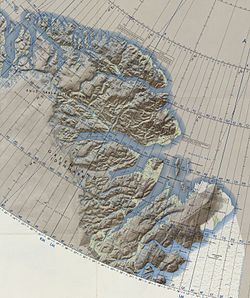Cape Bridgman
Cape Bridgman Kap Bridgman | |
|---|---|
 Map of Greenland section. | |
| Coordinates: 83°25′N 26°42′W / 83.417°N 26.700°W | |
| Location | Northeast Greenland National Park, Greenland |
| Offshore water bodies | Wandel Sea, Arctic Ocean |
| Area | |
| • Total | Arctic |
Cape Bridgman (Danish: Kap Bridgman) is a headland in the Wandel Sea, Arctic Ocean, northeast Greenland.
The cape was named by Robert Peary after Herbert L. Bridgman, one of the members of the Peary Arctic Club in New York.[1]
The northernmost human remains of the Independence I culture, and thus the world, was described at Cape Bridgman by Peter Dawes in a letter to Eigil Knuth; they comprise three sites of tent rings and flagstones, although it is likely that this was a short-term expedition with permanent settlement at Frigg Fjord slightly to the south.[2]
Geography
Cape Bridgman is located on the northern side of the mouth of Frederick E. Hyde Fjord, Peary Land. Cape John Flagler is the headland on the southern side of the fjord entrance.[3][4] Administratively it is part of the Northeast Greenland National Park.
In 1900 this headland was Robert Peary's easternmost accurate geographic exploration in the north of Greenland, for further south he encountered fog. In 1907 it became an important landmark for the Denmark expedition which mapped for the first time the unknown area to the south and southeast of the cape, as well as part of the Daly Range, rising to the west above the plain.[5]
 |
References
- ^ How Did Frederick E. Hyde Fjord Get Its Name?
- ^ Bjarne Grønnow, Jens Fog Jensen: The Northernmost Ruins of the Globe. Eigil Knuth’s Archaeological Investigations in Peary Land and Adjacent Areas of High Arctic Greenland (= Man & Society. Vol. 29). Museum Tusculanums Forlag, Københavns Universitet, Copenhagen 2003, ISBN 978-87-635-3065-1, 978-8763512626 pp. 219 & 236–237
- ^ Prostar Sailing Directions 2005 Greenland and Iceland Enroute, p. 125
- ^ "Kap Bridgman". Mapcarta. Retrieved 11 February 2019.
- ^ Spencer Apollonio, Lands That Hold One Spellbound: A Story of East Greenland, 2008 p. 101

